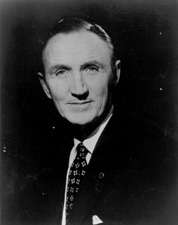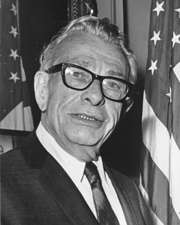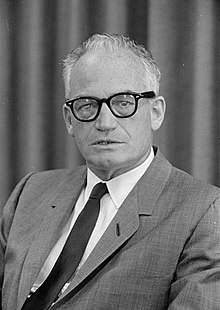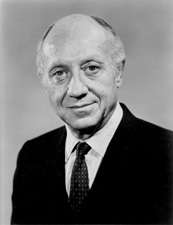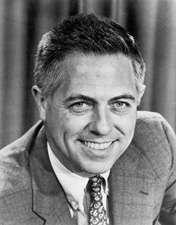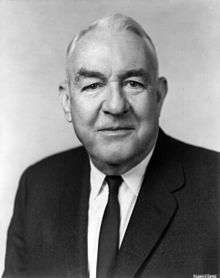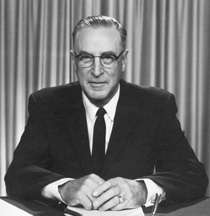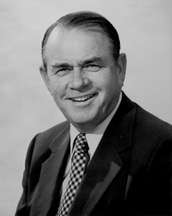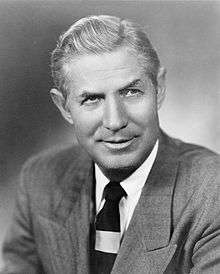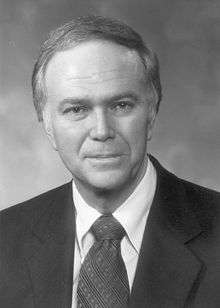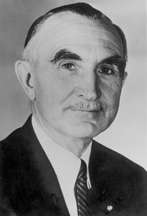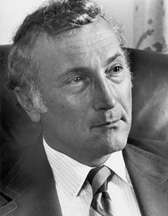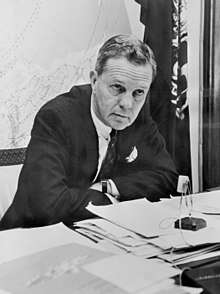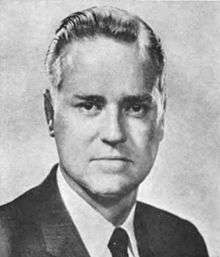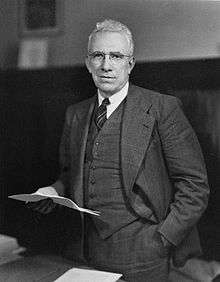United States Senate elections, 1968
|
| ||||||||||||||||||||||||||||||||||||||||
| ||||||||||||||||||||||||||||||||||||||||
34 of the 100 seats in the United States Senate 51 seats needed for a majority | ||||||||||||||||||||||||||||||||||||||||
|---|---|---|---|---|---|---|---|---|---|---|---|---|---|---|---|---|---|---|---|---|---|---|---|---|---|---|---|---|---|---|---|---|---|---|---|---|---|---|---|---|
| ||||||||||||||||||||||||||||||||||||||||
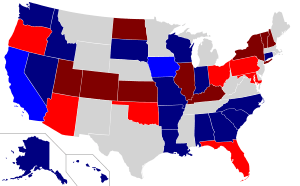 Results, with special elections Democratic gain Democratic hold Republican gain Republican hold | ||||||||||||||||||||||||||||||||||||||||
| ||||||||||||||||||||||||||||||||||||||||
The United States Senate elections, 1968 were elections for the United States Senate which coincided with the presidential election. Although Richard Nixon won the presidential election narrowly, the Republicans picked up five net seats in the Senate. Republicans would gain another seat after the election when Alaska Republican Ted Stevens was appointed to replace Democrat Bob Bartlett.
Incumbents who retired
Democratic hold
- Alabama: J. Lister Hill (D) was replaced by James Allen (D).
Democratic gain
- Iowa: Bourke B. Hickenlooper (R) was replaced by Harold Hughes (D).
Republican holds
- Kansas: Frank Carlson (R) was replaced by Bob Dole (R).
- Kentucky: Thruston Ballard Morton (R) was replaced by Marlow W. Cook (R).
Republican gains
- Arizona: Carl Hayden (D) was replaced by Barry Goldwater (R), who gave up Arizona's other Senate seat in 1964 to run for president.
- Florida: George Smathers (D) was replaced by Edward J. Gurney (R), the first Republican to represent Florida in the U.S. Senate since Reconstruction.
Incumbents who lost their seats
Democratic holds
- Alaska: Ernest Gruening (D) lost renomination to Mike Gravel (D), who later won the general election.
- Missouri: Edward V. Long (D) lost renomination to Thomas Eagleton (D), who later won the general election.
Democratic gain
- California: Thomas Kuchel (R) lost renomination to Max Rafferty (R), who later lost the general election to Alan Cranston (D).
Republican gains
- Maryland: Daniel Brewster (D) lost re-election to Charles Mathias, Jr. (R)
- Ohio: Frank J. Lausche (D) lost renomination to John J. Gilligan (D), who later lost the general election to William B. Saxbe (R).
- Oklahoma: A. S. Mike Monroney (D), lost re-election to Henry Bellmon (R).
- Oregon: Wayne Morse (D), lost re-election to Bob Packwood (R).
- Pennsylvania: Joseph S. Clark (D), lost re-election to Richard Schweiker (R).
Later change
Republican gain
- Alaska: Bob Bartlett (D) died December 11, 1968, and Ted Stevens (R) was appointed December 24, 1968.
Change in Senate composition
Before the elections
| D1 | D2 | D3 | D4 | D5 | D6 | D7 | D8 | D9 | D10 |
| D20 | D19 | D18 | D17 | D16 | D15 | D14 | D13 | D12 | D11 |
| D21 | D22 | D23 | D24 | D25 | D26 | D27 | D28 | D29 | D30 |
| D40 | D39 | D38 | D37 | D36 | D35 | D34 | D33 | D32 | D31 |
| D41 Ran |
D42 Ran |
D43 Ran |
D44 Ran |
D45 Ran |
D46 Ran |
D47 Ran |
D48 Ran |
D49 Ran |
D50 Ran |
| Majority → | D51 Ran | ||||||||
| D60 Ran |
D59 Ran |
D58 Ran |
D57 Ran |
D56 Ran |
D55 Ran |
D54 Ran |
D53 Ran |
D52 Ran | |
| D61 Retired |
D62 Retired |
D63 Retired |
R37 Retired |
R36 Retired |
R35 Retired |
R34 Ran |
R33 Ran |
R32 Ran |
R31 Ran |
| R21 | R22 | R23 | R24 | R25 | R26 | R27 Ran |
R28 Ran |
R29 Ran |
R30 Ran |
| R20 | R19 | R18 | R17 | R16 | R15 | R14 | R13 | R12 | R11 |
| R1 | R2 | R3 | R4 | R5 | R6 | R7 | R8 | R9 | R10 |
After the general elections
| D1 | D2 | D3 | D4 | D5 | D6 | D7 | D8 | D9 | D10 |
| D20 | D19 | D18 | D17 | D16 | D15 | D14 | D13 | D12 | D11 |
| D21 | D22 | D23 | D24 | D25 | D26 | D27 | D28 | D29 | D30 |
| D40 | D39 | D38 | D37 | D36 | D35 | D34 | D33 | D32 | D31 |
| D41 Re-elected |
D42 Re-elected |
D43 Re-elected |
D44 Re-elected |
D45 Re-elected |
D46 Re-elected |
D47 Re-elected |
D48 Re-elected |
D49 Re-elected |
D50 Re-elected |
| Majority → | D51 Re-elected | ||||||||
| R41 Gain |
R42 Gain |
D58 Gain |
D57 Gain |
D56 Hold |
D55 Hold |
D54 Hold |
D53 Re-elected |
D52 Re-elected | |
| R40 Gain |
R39 Gain |
R38 Gain |
R37 Gain |
R36 Gain |
R35 Hold |
R34 Hold |
R33 Re-elected |
R32 Re-elected |
R31 Re-elected |
| R21 | R22 | R23 | R24 | R25 | R26 | R27 Re-elected |
R28 Re-elected |
R29 Re-elected |
R30 Re-elected |
| R20 | R19 | R18 | R17 | R16 | R15 | R14 | R13 | R12 | R11 |
| R1 | R2 | R3 | R4 | R5 | R6 | R7 | R8 | R9 | R10 |
Beginning of the next Congress
| D1 | D2 | D3 | D4 | D5 | D6 | D7 | D8 | D9 | D10 |
| D20 | D19 | D18 | D17 | D16 | D15 | D14 | D13 | D12 | D11 |
| D21 | D22 | D23 | D24 | D25 | D26 | D27 | D28 | D29 | D30 |
| D40 | D39 | D38 | D37 | D36 | D35 | D34 | D33 | D32 | D31 |
| D41 | D42 | D43 | D44 | D45 | D46 | D47 | D48 | D49 | D50 |
| Majority → | D51 | ||||||||
| R41 | R42 | R43 gain |
D57 | D56 | D55 | D54 | D53 | D52 | |
| R40 | R39 | R38 | R37 | R36 | R35 | R34 | R33 | R32 | R31 |
| R21 | R22 | R23 | R24 | R25 | R26 | R27 | R28 | R29 | R30 |
| R20 | R19 | R18 | R17 | R16 | R15 | R14 | R13 | R12 | R11 |
| R1 | R2 | R3 | R4 | R5 | R6 | R7 | R8 | R9 | R10 |
| Key: |
|
|---|
Race summary
Elections leading to the next Congress
In these general elections, the winners were elected for the term beginning January 3, 1969; ordered by state.
All of the elections involved the Class 3 seats.
| State (linked to summaries below) |
Incumbent | Results | Candidates | ||
|---|---|---|---|---|---|
| Senator | Party | Electoral history | |||
| Alabama | J. Lister Hill | Democratic | 1938 (Appointed) 1938 1944 1950 1956 1962 |
Incumbent retired. New senator elected. Democratic hold. |
√ James Allen (Democratic) 70.0% Perry O. Hooper, Sr. (Republican) 22.1% Robert Schwenn (Independent) 8.0% |
| Alaska | Ernest Gruening | Democratic | 1958 1962 |
Incumbent lost renomination. Incumbent lost re-election as a Democratic write-in. New senator elected. Democratic hold. |
√ Mike Gravel (Democratic) 45.1% Elmer E. Rasmuson (Republican) 37.4% Ernest Gruening (Democratic Write-In) 17.4% |
| Arizona | Carl Hayden | Democratic | 1926 1932 1938 1944 1950 1956 1962 |
Incumbent retired. New senator elected. Republican gain. |
√ Barry Goldwater (Republican) 57.2% Roy Elson (Democratic) 42.8% |
| Arkansas | J. William Fulbright | Democratic | 1944 1950 1956 1962 |
Incumbent re-elected. | √ J. William Fulbright (Democratic) 59.2% Charles T. Bernard (Republican) 40.9% |
| California | Thomas Kuchel | Republican | 1953 (Appointed) 1954 (Special) 1956 1962 |
Incumbent lost renomination. New senator elected. Democratic gain. |
√ Alan Cranston (Democratic) 51.8% Max Rafferty (Republican) 46.9% Paul Jacobs (Peace & Freedom) 1.3% |
| Colorado | Peter H. Dominick | Republican | 1962 | Incumbent re-elected. | √ Peter H. Dominick (Republican) 58.6% Stephen L.R. McNichols (Democratic) 41.5% |
| Connecticut | Abraham A. Ribicoff | Democratic | 1962 | Incumbent re-elected. | √ Abraham A. Ribicoff (Democratic) 54.3% Edwin H. May, Jr. (Republican) 45.7% |
| Florida | George Smathers | Democratic | 1950 1956 1962 |
Incumbent retired. New senator elected. Republican gain. |
√ Edward J. Gurney (Republican) 55.9% LeRoy Collins (Democratic) 44.1% |
| Georgia | Herman Talmadge | Democratic | 1956 1962 |
Incumbent re-elected. | √ Herman Talmadge (Democratic) 77.5% E. Earl Patton (Republican) 22.5% |
| Hawaii | Daniel Inouye | Democratic | 1962 | Incumbent re-elected. | √ Daniel Inouye (Democratic) 83.4% Wayne C. Thiessen (Republican) 15.0% |
| Idaho | Frank Church | Democratic | 1956 1962 |
Incumbent re-elected. | √ Frank Church (Democratic) 60.3% George V. Hansen (Republican) 39.7% |
| Illinois | Everett Dirksen | Republican | 1950 1956 1962 |
Incumbent re-elected. | √ Everett Dirksen (Republican) 53.0% William G. Clark (Democratic) 46.6% |
| Indiana | Birch Bayh | Democratic | 1962 | Incumbent re-elected. | √ Birch Bayh (Democratic) 51.7% William Ruckelshaus (Republican) 48.2% |
| Iowa | Bourke B. Hickenlooper | Republican | 1944 1950 1956 1962 |
Incumbent retired. New senator elected. Democratic gain. |
√ Harold Hughes (Democratic) 50.3% David M. Stanley (Republican) 49.7% |
| Kansas | Frank Carlson | Republican | 1950 (Special) 1950 1956 1962 |
Incumbent retired. New senator elected. Republican hold. |
√ Bob Dole (Republican) 60.1% William I. Robinson (Democratic) 38.7% |
| Kentucky | Thruston B. Morton | Republican | 1956 1962 |
Incumbent retired. New senator elected. Republican hold. |
√ Marlow W. Cook (Republican) 51.4% Katherine Peden (Democratic) 47.6% |
| Louisiana | Russell B. Long | Democratic | 1948 (Special) 1950 1956 1962 |
Incumbent re-elected. | √ Russell B. Long (Democratic) Unopposed |
| Maryland | Daniel Brewster | Democratic | 1962 | Incumbent lost re-election. New senator elected. Republican gain. |
√ Charles Mathias, Jr. (Republican) 47.8% Daniel Brewster (Democratic) 39.1% George P. Mahoney (American Independent) 13.1% |
| Missouri | Edward V. Long | Democratic | 1960 (Appointed) 1960 (Special) 1962 |
Incumbent lost renomination. New senator elected. Democratic hold. |
√ Thomas Eagleton (Democratic) 51.1% Thomas B. Curtis (Republican) 48.9% |
| Nevada | Alan Bible | Democratic | 1954 (Special) 1956 1962 |
Incumbent re-elected. | √ Alan Bible (Democratic) 54.8% Edward Fike (Republican) 45.2% |
| New Hampshire | Norris Cotton | Republican | 1954 (Special) 1956 1962 |
Incumbent re-elected. | √ Norris Cotton (Republican) 59.3% John W. King (Democratic) 40.7% |
| New York | Jacob K. Javits | Republican | 1956 1962 |
Incumbent re-elected. | √ Jacob K. Javits (Republican) 49.7% Paul O'Dwyer (Democratic) 32.7% James L. Buckley (Conservative) 17.3% |
| North Carolina | Sam Ervin | Democratic | 1954 (Special) 1954 (Appointed) 1956 1962 |
Incumbent re-elected. | √ Sam Ervin (Democratic) 60.6% Robert V. Somers (Republican) 39.4% |
| North Dakota | Milton Young | Republican | 1945 (Appointed) 1946 (Special) 1950 1956 1962 |
Incumbent re-elected. | √ Milton Young (Republican) 64.6% Herschel Lashkowitz (Democratic) 33.7% |
| Ohio | Frank J. Lausche | Democratic | 1956 1962 |
Incumbent lost renomination. New senator elected. Republican gain. |
√ William B. Saxbe (Republican) 51.5% John J. Gilligan (Democratic) 48.5% |
| Oklahoma | Mike Monroney | Democratic | 1950 1956 1962 |
Incumbent lost re-election. New senator elected. Republican gain. |
√ Henry Bellmon (Republican) 51.7% Mike Monroney (Democratic) 46.2% |
| Oregon | Wayne Morse | Democratic | 1944 1950 1956 1962 |
Incumbent lost re-election. New senator elected. Republican gain. |
√ Bob Packwood (Republican) 50.2% Wayne Morse (Democratic) 49.8% |
| Pennsylvania | Joseph S. Clark | Democratic | 1956 1962 |
Incumbent lost re-election. New senator elected. Republican gain. |
√ Richard Schweiker (Republican) 51.9% Joseph S. Clark (Democratic) 45.8% |
| South Carolina | Ernest Hollings | Democratic | 1966 (Special) | Incumbent re-elected. | √ Ernest Hollings (Democratic) 61.9% Marshall Parker (Republican) 38.1% |
| South Dakota | George McGovern | Democratic | 1962 | Incumbent re-elected. | √ George McGovern (Democratic) 56.8% Archie M. Gubbrud (Republican) 43.2% |
| Utah | Wallace F. Bennett | Republican | 1950 1956 1962 |
Incumbent re-elected. | √ Wallace F. Bennett (Republican) 53.7% Milton N. Wellenmann (Democratic) 45.8% |
| Vermont | George Aiken | Republican | 1940 (Special) 1944 1950 1956 1962 |
Incumbent re-elected. | √ George Aiken (Republican) 99.9% Unopposed |
| Washington | Warren Magnuson | Democratic | 1944 (Appointed) 1944 1950 1956 1962 |
Incumbent re-elected. | √ Warren G. Magnuson (Democratic) 64.4% Jack Metcalf (Republican) 35.3% |
| Wisconsin | Gaylord Nelson | Democratic | 1962 | Incumbent re-elected. | √ Gaylord Nelson (Democratic) 61.7% Jerris Leonard (Republican) 38.3% |
Alabama
Alaska
Arizona
|
| |||||||||||||||||
| |||||||||||||||||
| |||||||||||||||||
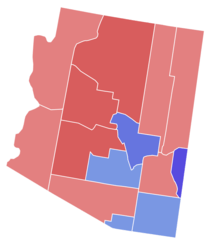 U.S. Senate election results map. Red denotes counties won by Goldwater. Blue denotes those won by Elson. | |||||||||||||||||
| |||||||||||||||||
Incumbent Democrat Carl Hayden did not run for re-election to an eighth term, with his longtime staff member Roy Elson running as the Democratic Party nominee to replace him. Elson was defeated by a wide margin, however, by former U.S. Senator and Republican Presidential nominee Barry Goldwater. Prior to Goldwater's election, the seat had been held for decades by the Democratic Party under Carl Hayden, and has thus far remained in Republican Party control since. Elson had previously challenged U.S. Senator Paul Fannin in 1964, when Goldwater vacated his seat in order to run for President against Lyndon B. Johnson.
| Party | Candidate | Votes | % | |
|---|---|---|---|---|
| Democratic | Roy Elson, Staff member to Senator Carl Hayden, 1964 Democratic nominee for U.S. Senate |
95,231 | 62.78% | |
| Democratic | Bob Kennedy, State Treasurer of Arizona |
41,397 | 27.29% | |
| Total votes | 136,628 | 100.00 | ||
| Party | Candidate | Votes | % | ± | |
|---|---|---|---|---|---|
| Republican | Barry Goldwater, former U.S. Senator, 1964 Republican Party nominee for President of the United States |
274,607 | 57.22% | ||
| Democratic | Roy Elson | 205,338 | 42.78% | ||
| Majority | 69,269 | 14.44% | |||
| Turnout | 479,945 | ||||
| Republican gain from Democratic | Swing | ||||
Arkansas
California
Colorado
Connecticut
Florida
Georgia
Hawaii
Idaho
Illinois
|
| |||||||||||||||||
| |||||||||||||||||
| |||||||||||||||||
| |||||||||||||||||
Incumbent Republican and Minority Leader Everett Dirksen won re-election to his fourth term over William G. Clark (D), the Illinois Attorney General.
| Party | Candidate | Votes | % | |
|---|---|---|---|---|
| Republican | Everett Dirksen (Incumbent) | 2,358,947 | 53.01 | |
| Democratic | William G. Clark | 2,073,242 | 46.59 | |
| Socialist Labor | Louis Fisher | 17,542 | 0.39 | |
| Independent | Write-in candidates | 26 | 0.00 | |
| Invalid or blank votes | ||||
| Total votes | 4,449,757 | 100.00 | ||
| Turnout | ||||
| Republican hold | ||||
Indiana
Iowa
Kansas
Kentucky
Louisiana
Maryland
Missouri
Nevada
New Hampshire
New York
|
| |||||||||||||||||||||
| |||||||||||||||||||||
| |||||||||||||||||||||
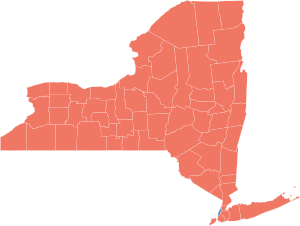 County results | |||||||||||||||||||||
| |||||||||||||||||||||
Incumbent Republican Jacob K. Javits won against Democratic challenger Paul O'Dwyer and Conservative Party challenger James L. Buckley in a three-way election.
While Javits did not face any challengers for the Republican nomination, he did face a minor one when seeking the Liberal Party of New York's nomination.
| Party | Candidate | Votes | % | |
|---|---|---|---|---|
| Liberal | Jacob K. Javits | 10,277 | 72.14% | |
| Liberal | Murray Baron | 3,969 | 27.86% | |
| Total votes | 14,246 | 100.00% | ||
| Party | Candidate | Votes | % | |
|---|---|---|---|---|
| Democratic | Paul O'Dwyer, former New York City Councilman |
275,877 | 36.14% | |
| Democratic | Eugene Nickerson, Nassau County Executive |
257,639 | 33.75% | |
| Democratic | Joseph Y. Resnick, U.S. Representative |
229,893 | 30.11% | |
| Total votes | 763,409 | 100.00% | ||
| Party | Candidate | Votes | % | ± | |
|---|---|---|---|---|---|
| Republican | Jacob K. Javits | 2,810,836 | |||
| Liberal | Jacob K. Javits | 458,936 | |||
| Total | Jacob K. Javits | 3,269,772 | 49.68% | -7.70% | |
| Democratic | Paul O'Dwyer | 2,150,695 | 32.68% | -7.46% | |
| Conservative (N.Y.) | James L. Buckley, Attorney |
1,139,402 | 17.31% | +15.27% | |
| Peace and Freedom | Herman Ferguson | 8,775 | 0.13% | +0.13% | |
| Socialist Labor | John Emanuel | 7,964 | 0.12% | -0.02% | |
| Socialist Workers | Hedda Garza | 4,979 | 0.08% | -0.23% | |
North Carolina
|
| |||||||||||||||||
| |||||||||||||||||
| |||||||||||||||||
| |||||||||||||||||
The general election was fought between the Democratic incumbent Sam Ervin and the Republican nominee Robert Somers. Ervin won re-election to a third full term, with over 60% of the vote.
The first round of the Primary Election was held on May 4, 1968.[7] The runoff for the Republican Party candidates took place on June 1.[8]
| Party | Candidate | Votes | % | ± | |
|---|---|---|---|---|---|
| Democratic | Sam Ervin | 499,392 | 82.12% | ||
| Democratic | Charles Pratt | 60,362 | 9.90% | ||
| Democratic | John Gathings | 48,357 | 7.95% | ||
| Turnout | 608,111 | ||||
| Party | Candidate | Votes | % | ± | |
|---|---|---|---|---|---|
| Republican | Robert Somers | 48,351 | 36.63% | ||
| Republican | J. L. Zimmerman | 43,644 | 33.06% | ||
| Republican | B. E. Sweatt | 40,023 | 30.32% | ||
| Turnout | 132,018 | ||||
| Party | Candidate | Votes | % | ± | |
|---|---|---|---|---|---|
| Republican | Robert Somers | 8,816 | 60.59% | ||
| Republican | J. L. Zimmerman | 5,734 | 39.41% | ||
| Turnout | 14,550 | ||||
| Party | Candidate | Votes | % | ± | |
|---|---|---|---|---|---|
| Democratic | Sam Ervin | 870,406 | 60.56% | ||
| Republican | Robert Somers | 566,834 | 39.44% | ||
| Turnout | 901,978 | ||||
North Dakota
|
| |||||||||||||||||
| |||||||||||||||||
| |||||||||||||||||
| |||||||||||||||||
The 1968 U.S. Senate election for the state of North Dakota was held November 5, 1968. The incumbent, Republican Senator Milton Young, sought and received re-election to his fifth term, defeating North Dakota Democratic-NPL Party candidate Herschel Lashkowitz, the mayor of Fargo, North Dakota since 1954.[9][10]
Only Young filed as a Republican, and the endorsed Democratic candidate was Herschel Lashkowitz of Fargo, North Dakota, who was serving as the mayor of the city since 1954. Young and Lashkowitz won the primary elections for their respective parties.
One independent candidate, Duane Mutch of Larimore, North Dakota, also filed before the deadline. Mutch was later a state senator for the North Dakota Republican Party in the North Dakota Senate from 1959 to 2006 for District 19. He ran as an independent when he did not receive his party's nomination.
| Party | Candidate | Votes | % | ± | |
|---|---|---|---|---|---|
| Republican | Milton R. Young | 154,968 | 64.79% | ||
| Democratic | Herschel Lashkowitz | 80,815 | 33.79% | ||
| Independent | Duane Mutch | 3,393 | 1.42% | ||
| Majority | |||||
| Turnout | 239,176 | ||||
Ohio
Oklahoma
|
| |||||||||||||||||
| |||||||||||||||||
| |||||||||||||||||
| |||||||||||||||||
Incumbent Democratic U.S. Senator Mike Monroney was running for re-election to a fourth term, but was defeated by Republican former Governor Henry Bellmon.
| Party | Candidate | Votes | % | ± | |
|---|---|---|---|---|---|
| Republican | Henry Bellmon | 470,120 | 51.7% | ||
| Democratic | Mike Monroney | 419,658 | 46.2% | ||
| Independent | George Washington | 19,341 | 2.1% | ||
Oregon
|
| |||||||||||||||||
| |||||||||||||||||
| |||||||||||||||||
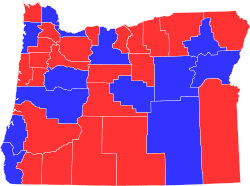 County results | |||||||||||||||||
| |||||||||||||||||
Incumbent Democrat Wayne Morse was seeking a fifth term, but narrowly lost re-election to 36 year-old Republican State Representative Bob Packwood race.[12]
The Democratic primary was held May 28, 1968.[13] Morse defeated former Representative Robert B. Duncan, former U.S. Congressman from Oregon's 4th congressional district (1963–1967), and Phil McAlmond, millionaire and former aide to opponent Robert B. Duncan.
| Party | Candidate | Votes | % | |
|---|---|---|---|---|
| Democratic | Wayne Morse (Incumbent) | 185,091 | 49.03% | |
| Democratic | Robert B. Duncan | 174,795 | 46.30% | |
| Democratic | Phil McAlmond | 17,658 | 4.68% | |
| Total votes | 377,544 | 100.00% | ||
| Party | Candidate | Votes | % | |||
|---|---|---|---|---|---|---|
| Republican | Bob Packwood | 408,646 | 50.20% | |||
| Democratic | Wayne Morse (Incumbent) | 405,353 | 49.80% | |||
| Total votes | 813,999 | 100.00% | ||||
| Republican gain from Democratic | ||||||
Pennsylvania
|
| |||||||||||||||||
| |||||||||||||||||
| |||||||||||||||||
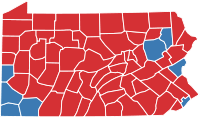 County results | |||||||||||||||||
| |||||||||||||||||
Incumbent Democrat Joseph Clark sought re-election to another term, but was defeated by Republican nominee Richard Schweiker, member of the U.S. House of Representatives.
| Party | Candidate | Votes | % | |
|---|---|---|---|---|
| Republican | Richard Schweiker | 2,399,762 | 51.90% | |
| Democratic | Joseph S. Clark Jr. | 2,117,662 | 45.80% | |
| Constitution | Frank W. Gaydosh | 96,742 | 2.09% | |
| Socialist Labor | Benson Perry | 7,198 | 0.16% | |
| Socialist Workers | Pearl Chertov | 2,743 | 0.06% | |
| Other | Other | 111 | 0.00% | |
South Carolina
|
| |||||||||||||||||
| |||||||||||||||||
| |||||||||||||||||
| |||||||||||||||||
Incumbent Democrat Fritz Hollings easily defeated Republican state senator Marshall Parker in a rematch of the election two years earlier to win his first full term.
Hollings faced no opposition from South Carolina Democrats and avoided a primary election. Marshall Parker, the state senator from Oconee County in the Upstate, was persuaded by South Carolina Republicans to enter the race and he did not face a primary challenge.
After a close election loss to Fritz Hollingsin 1966, the Republicans felt that Parker might have a chance at defeating Hollings by riding Nixon's coattails in the general election. However, the Republicans did not provide Parker with the financial resources to compete and he subsequently lost by a bigger margin to Hollings than two years prior.
| Party | Candidate | Votes | % | ± | |
|---|---|---|---|---|---|
| Democratic | Fritz Hollings | 404,060 | 61.9% | -10.6% | |
| Republican | Marshall Parker | 248,780 | 38.1% | -10.6% | |
| No party | Write-Ins | 15 | 0.0% | 0.0% | |
| Majority | 155,280 | 23.8% | +21.2% | ||
| Turnout | 652,855 | 76.5% | +27.4% | ||
| Democratic hold | |||||
South Dakota
Utah
Vermont
|
| |||||||||||||||||
| |||||||||||||||||
| |||||||||||||||||
| |||||||||||||||||
Incumbent Republican George Aiken ran successfully for re-election to another term in the United States Senate; he was unopposed.
| Party | Candidate | Votes | % | ± | |
|---|---|---|---|---|---|
| Republican | George Aiken (Incumbent) | 42,248 | 72.8% | ||
| Republican | William K. Tufts | 15,786 | 27.2% | ||
| Republican | Other | 28 | 0.0% | ||
| Total votes | 58,062 | 100.0% | |||
| Party | Candidate | Votes | % | ± | |
|---|---|---|---|---|---|
| Write-in | George Aiken (Incumbent) | 1,534 | 61.8% | ||
| Write-in | Philip H. Hoff | 400 | 18.2% | ||
| Democratic | Other | 438 | 20.0% | ||
| Total votes | 2,192 | 100.0% | |||
| Party | Candidate | Votes | % | ± | |
|---|---|---|---|---|---|
| Republican | George Aiken (Incumbent) | 94,738 | 60.2% | ||
| Democratic | George Aiken (Incumbent) | 62,416 | 39.7% | ||
| No party | George Aiken (Incumbent) | 43 | 0.0% | ||
| Total | George Aiken (Incumbent) | 157,197 | 99.9% | ||
| N/A | Other | 178 | 0.1% | ||
| Total votes | 157,375 | 100.0% | |||
Washington
Wisconsin
Incumbent democrat Gaylord A. Nelson (U.S. Senator since 1963) defeated Republican State Senator Jerris Leonard.
| Party | Candidate | Votes | % | |
|---|---|---|---|---|
| Democratic | Gaylord Nelson | 1,020,931 | 61.69% | |
| Republican | Jerris Leonard | 633,910 | 38.31% | |
Notes
- ↑ "AZ US Senate - D Primary Race - Sep 10, 1968". Our Campaigns. Retrieved 2017-12-19.
- ↑ "AZ US Senate Race - Nov 05, 1968". Our Campaigns. Retrieved 2017-12-19.
- ↑ "1968 Senatorial General Election Results - Illinois".
- ↑ "NY US Senate - L Primary Race - Jun 18, 1968". Our Campaigns. Retrieved 2017-12-19.
- ↑ "NY US Senate - D Primary Race - Jun 18, 1968". Our Campaigns. Retrieved 2017-12-19.
- ↑ "NY US Senate Race - Nov 05, 1968". Our Campaigns. Retrieved 2017-12-19.
- ↑ "NC US Senate - D Primary Race - May 04, 1968". Our Campaigns. Retrieved 2017-12-19.
- ↑ "NC US Senate - R Runoff Race - Jun 01, 1968". Our Campaigns. Retrieved 2017-12-19.
- 1 2 "Statistics of the Presidential and Congressional Election of November 5, 1968, corrected to July 1, 1969" (PDF). Clerk of the United States House of Representatives – via House.gov.
- ↑ Lashkowitz's storied tenure
- ↑ "OK US Senate Race - Nov 05, 1968". Our Campaigns. Retrieved 2017-12-19.
- 1 2 "OR US Senate" – via OurCampaigns.com.
- 1 2 "OR US Senate - D Primary" – via OurCampaigns.com.
- 1 2 "Primary Election Results" (PDF). Office of the Vermont Secretary of State. Retrieved June 17, 2015.
- ↑ "General Election Results - U.S. Senator - 1914-2014" (PDF). Office of the Vermont Secretary of State. Retrieved June 17, 2015.
References
- "Supplemental Report of the Secretary of State to the General Assembly of South Carolina." Reports and Resolutions of South Carolina to the General Assembly of the State of South Carolina. Volume II. Columbia, SC: 1969, p. 19.
- Kalk, Bruce H. (2001). The Origins of the Southern Strategy: Two-Party Competition in South. Lexington Books. p. 86.
